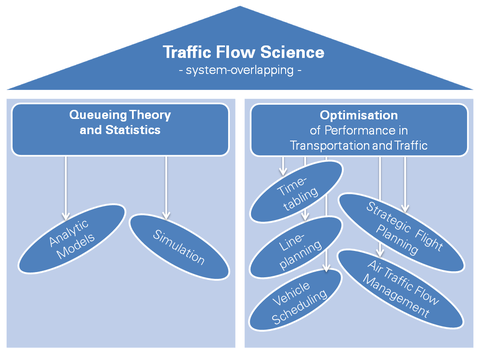Traffic Flow Science
Historically Traffic Flow Science is engaged in the basic theories of traffic flows in networks, the analysis of transportation and traffic systems as well as the mathematical modeling of transporation processes in order to deduce conclusions on the configuration, management and safety of transportation and traffic systems as well as the capability and process performance of system elements in the context of the overall system. In addition stochastic methods and queuing theory are applied. Based on this analytical consideration of transportation and traffic processes the requirements for modeling such systems grow considerably. The enhanced modeling needs aim at higher model accuracy in transportational terms. The coupling of analytic modeling with stochastic simulation and heuristic as well as exact search methods in complex optimisation problems describes the modern Traffic Flow Science of the chair.
In 2000 Professor Nachtigall became appointed as holder of the Chair of Traffic Flow Science. His scientific approach to transportation and traffic science implements operations research as methodolgy of business arithmetics into the field of transportatiopn and traffic. The knowledge base is accordingly teached in close reference to mathematical theories and methods but in consideration of carrier-specific fundamentals. The development of complex transportation models requires custom-related expert knowledge ensuring the approriate transformation of the system-specific problem into the mathematical model.
Our teaching and research profile aims at systemic transportation problems as well as at akin topics. Operating procedures are represented in system models using an analysis and solution approach across several carriers. The theoretic fundament is the so-called "Dresdner Schule" which received significant methodological extensions by modern arithmetic impulses.

